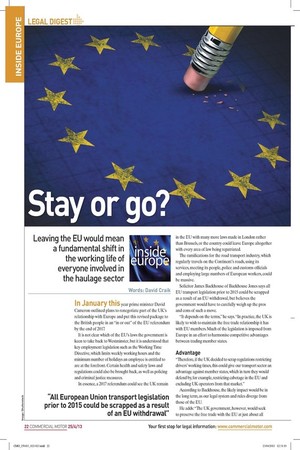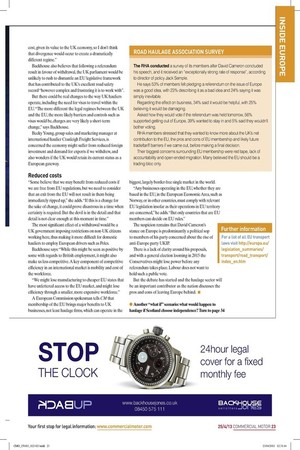Leaving the EU would mean a fundamental shift in the
Page 15

Page 16

If you've noticed an error in this article please click here to report it so we can fix it.
working life of everyone involved in the haulage sector Words: David Craik In January this year prime minister David Cameron outlined plans to renegotiate part of the UK's relationship with Europe and put this revised package to the British people in an "in or out" of the EU referendum by the end of 2017.
It is not clear which of the EU's laws the government is keen to take back to Westminster, but it is understood that key employment legislation such as the Working Time Directive, which limits weekly working hours and the minimum number of holidays an employee is entitled to are at the forefront. Certain health and safety laws and regulations could also be brought back, as well as policing and criminal justice measures.
In essence, a 2017 referendum could see the UK remain in the EU with many more laws made in London rather than Brussels, or the country could leave Europe altogether with every area of law being repatriated.
The ramifications for the road transport industry, which regularly travels on the Continent's roads, using its services, meeting its people, police and customs officials and employing large numbers of European workers, could be massive.
Solicitor James Backhouse of Backhouse Jones says all EU transport legislation prior to 2015 could be scrapped as a result of an EU withdrawal, but believes the government would have to carefully weigh up the pros and cons of such a move.
"It depends on the terms," he says. "In practice, the UK is likely to wish to maintain the free trade relationship it has with EU members. Much of the legislation is imposed from Europe in an effort to harmonise competitive advantages between trading member states.
Advantage "Therefore, if the UK decided to scrap regulations restricting drivers' working times, this could give our transport sector an advantage against member states, which in turn they would defend by, for example, restricting cabotage in the EU and excluding UK operators from that market."
According to Backhouse, the likely impact would be in the long term, as our legal system and rules diverge from those of the EU.
He adds: "The UK government, however, would seek to preserve the free trade with the EU at just about all cost, given its value to the UK economy, so I don't think that divergence would occur to create a dramatically different regime."
Backhouse also believes that following a referendum result in favour of withdrawal, the UK parliament would be unlikely to rush to dismantle an EU legislative framework that has contributed to the UK's excellent road safety record "however complex and frustrating it is to work with".
But there could be real changes to the way UK hauliers operate, including the need for visas to travel within the EU. "The more different the legal regimes between the UK and the EU, the more likely barriers and controls such as visas would be, charges are very likely a short-term change," says Backhouse.
Becky Young, group sales and marketing manager at international haulier Cranleigh Freight Services, is concerned the economy might suffer from reduced foreign investment and demand for exports if we withdrew, and also wonders if the UK would retain its current status as a European gateway.
Reduced costs "Some believe that we may benefit from reduced costs if we are free from EU regulations, but we need to consider that an exit from the EU will not result in them being immediately ripped up," she adds. "If this is a change for the sake of change, it could prove disastrous in a time when certainty is required. But the devil is in the detail and that detail is not clear enough at this moment in time."
The most significant effect of a withdrawal would be a UK government imposing restrictions on non-UK citizens working here, thus making it more difficult for domestic hauliers to employ European drivers such as Poles.
Backhouse says: "While this might be seen as positive by some with regards to British employment, it might also make us less competitive. A key component of competitive efficiency in an international market is mobility and cost of the workforce.
"We might lose manufacturing to cheaper EU states that have unfettered access to the EU market, and might lose efficiency through a smaller, more expensive workforce."
A European Commission spokesman tells CM that membership of the EU brings major benefits to UK businesses, not least haulage firms, which can operate in the biggest, largely border-free single market in the world.
"Any businesses operating in the EU, whether they are based in the EU, in the European Economic Area, such as Norway, or in other countries, must comply with relevant EU legislation insofar as their operations in EU territory are concerned," he adds. "But only countries that are EU members can decide on EU rules."
The suspicion remains that David Cameron's stance on Europe is predominantly a political sop to members of his party concerned about the rise of anti-Europe party UKIP.
There is a lack of clarity around his proposals, and with a general election looming in 2015 the Conservatives might lose power before any referendum takes place. Labour does not want to hold such a public vote.
But the debate has started and the haulage sector will be an important contributor as the nation discusses the pros and cons of leaving Europe behind. • • Another "what if" scenario: what would happen to haulage if Scotland choose independence? Turn to page 34







































